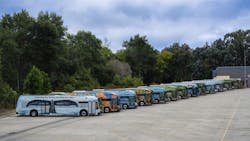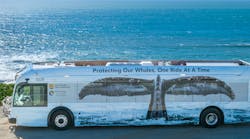Santa Cruz Metro makes largest acquisition of FCEBs in North American history
Santa Cruz Metropolitan Transit District (Santa Cruz Metro) Board of Directors has approved the purchase of 57 hydrogen-powered, fuel cell electric buses (FCEBs). This procurement will be the largest acquisition of FCEBs in North American history.
“Santa Cruz Metro has a long-standing commitment of being an environmental partner to our community and now thanks to Santa Cruz Metro Board and staff, we can further enhance this commitment with the largest single fuel cell electric bus purchase in North America,” said Santa Cruz Metro Board Chair, Shebreh Kalantari-Johnson. “Making Santa Cruz Metro a national leader in environmentally friendly public transportation and a key environmental community partner.”
Santa Cruz Metro expects to start taking delivery of the 57 new FCEBs in late 2024, which includes 48 40-foot buses and nine 60-foot articulated buses. Most of which will be deployed in the Watsonville service area, which the agency has committed to fully serving with zero-emissions vehicles from this historic purchase.
The new vehicles will replace ageing compressed natural gas (CNG) and diesel buses, converting 59 percent of Santa Cruz Metro’s fleet to zero emissions. This will support the transition of 100 percent of Santa Cruz Metro’s fleet to zero-emission technology years ahead of the deadline set in the state’s Innovative Clean Transit (ICT) Regulation.
Currently, 10 percent of Santa Cruz Metro’s fleet is composed of zero-emissions buses (ZEB). This single purchase will jump that total to more than 69 percent. Taken as a whole, converting over 69 percent of Santa Cruz Metro's CNG and diesel fleet to zero-emission FCEBs will result in a total GHG emissions reduction of 1.2 million MTCO2e.
“Santa Cruz Metro has set an aggressive goal to be 100 percent emissions-free by 2037,” said Santa Cruz Metro CEO/General Manager Michael Tree. “The purchase of these buses is a vital piece of our climate action plan to meet the state of California’s clean energy mandates.”
In a related project, Santa Cruz Metro will also construct a hydrogen fueling station to support the ZEB transition of the agency’s 94-bus fleet. Future upgrades to the hydrogen fueling station will allow enough capacity to support the zero-emissions fueling needs of local partner agencies and others.
The FCEB procurement is made possible, in part, through $20.4 million in grant funding from the Federal Transit Administration’s FY23 Bus and Bus Facilities program and a $38.6 million award from the California State Transportation Agency’s Transit and Intercity Rail Capital Program (TIRCP). Santa Cruz Metro has also applied for $27 million from the California Air Resources Board’s Volkswagen Environmental Mitigation Trust, which is administered by the San Joaquin Valley Air Pollution Control District.
In June, Santa Cruz Metro committed to purchase the FCEBs from North American bus manufacturer New Flyer. In August, the California Transportation Commission (CTC) approved Santa Cruz Metro’s request to purchase the FCEBs using 2023 TIRCP award funds.
To also support Santa Cruz Metro’s efforts, as an environmentally focused community partner, METRO also gives riders the opportunity to protect the Monterey Bay’s extraordinary natural resources just by simply riding the bus via the One Ride at a Time (ORAT) program. Thanks to ORAT, every ride on a METRO bus contributes to our partners in protecting the environment, the Monterey Bay National Marine Sanctuary Foundation and the Bay of Life Fund through the GO Santa Cruz ridesharing incentive program. To participate, riders simply need to log 25 rides to make a $10 contribution to one of Santa Cruz Metro’s local environmental non-profit partners.




